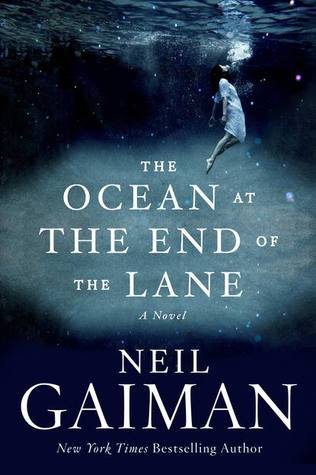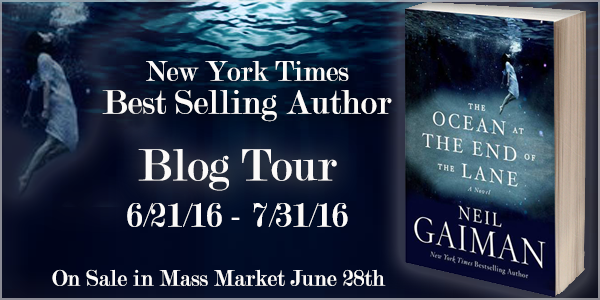 The Ocean at the End of the Lane by Neil Gaiman
The Ocean at the End of the Lane by Neil Gaiman Formats available: hardcover, paperback, ebook, audiobook
Pages: 178
Published by William Morrow Books on June 18th 2013
Purchasing Info: Author's Website, Publisher's Website, Amazon, Barnes & Noble, Kobo, Bookshop.org
Goodreads
Sussex, England. A middle-aged man returns to his childhood home to attend a funeral. Although the house he lived in is long gone, he is drawn to the farm at the end of the road, where, when he was seven, he encountered a most remarkable girl, Lettie Hempstock, and her mother and grandmother. He hasn't thought of Lettie in decades, and yet as he sits by the pond (a pond that she'd claimed was an ocean) behind the ramshackle old farmhouse, the unremembered past comes flooding back. And it is a past too strange, too frightening, too dangerous to have happened to anyone, let alone a small boy.
Forty years earlier, a man committed suicide in a stolen car at this farm at the end of the road. Like a fuse on a firework, his death lit a touchpaper and resonated in unimaginable ways. The darkness was unleashed, something scary and thoroughly incomprehensible to a little boy. And Lettie—magical, comforting, wise beyond her years—promised to protect him, no matter what.
A groundbreaking work from a master, The Ocean at the End of the Lane is told with a rare understanding of all that makes us human, and shows the power of stories to reveal and shelter us from the darkness inside and out. It is a stirring, terrifying, and elegiac fable as delicate as a butterfly's wing and as menacing as a knife in the dark.
My Review:
If the man who is never named, who may be someone not dissimilar to the author, returns to that ocean at the end of that lane so that Lettie can see if her sacrifice was worth it, readers are left with the certainty that it was.
If only that so we can read this strange and marvelous story that has bits of fantasy, parts of horror, and a few things that go bump in the night. Along with the sense both that we never quite grow up, and that the bits and pieces we remember of our childhoods do not necessarily resemble what actually happened.
And probably shouldn’t.
From one perspective, this story is relatively simple. A man returns to his childhood home for a funeral, and in his grief he finds himself wandering back to the places he knew as a child.
Much of his childhood has been torn down, and this is not surprising, it happens to all of us as we reach middle-age. But one place is still standing, because it is a place that has always been standing, and possibly always will be, even after the rest of us have turned to dust.
It is the place where the narrator experienced something both wonderful and terrible, an experience that was awful both in the sense that it was a horrible thing to have happen , and in its original sense, that it was full of awe. But it was an experience that his seven-year-old self wasn’t ready to experience, and one that his ordinary self is unable to remember.
Except when he returns, as he sometimes does, to remember what really happened and to give an accounting of his life to the one person who made it all possible.
And it’s magic.
Escape Rating A: Fair warning, this is going to be one of those reviews where I mostly talk about how the book made me feel. I’m not sure there is any other way to approach it.
Although most of the events being recounted happened to the protagonist when he was seven, this is an adult book. It is the man looking back on those events, and recognizing that there are things he knows now that he didn’t know then. And sometimes vice-versa.
The Ocean at the End of the Lane is a story that will either charm you and draw you in, or it won’t. It is also not quite what you might be expecting. There is a sense that it is fantasy, a possibility that it is horror, and even a chance that everything the author thinks he remembers is mostly a story that he tells himself rather than events that he actually remembers.
There are readers, who will be turned off by the child’s perspective, and there are readers who will be turned off by the fantasy elements that are inserted into the real world. Obviously, I wasn’t one of them. I found the sense that he was telling the story to himself added to the magic. It felt like a memory of the things you think you see out of the corner of your eyes – or when when you turn suddenly and what you thought was there seemingly isn’t.
This is also one of those stories that when you finish, you look back at what you read and are forced to view it in an entirely different way because of what you have learned. One of the ways in which the author turns this trope on its head is that while the reader ends with enough knowledge to re-evaluate the whole story, the protagonist forgets all that he has learned. Again.
What he experienced, what he learned, is too magical, too real, to exist in the mundane world. But it is such an important part of what made him who he is that it is necessary, every once in awhile, that he come to Lettie’s Ocean to remember it all over again.
And as the reader, I am very grateful for that.
If you believe that the world is much, much stranger than it seems, and that there are forces both wondrous and terrible still lurking in its hidden corners, this book is an incredible, and intense, treat.

